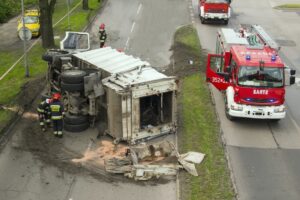Dump trucks and garbage trucks are very large and heavy vehicles. Consequently, serious accidents and injuries may result when a driver or others behave negligently. In a truck accident claim or lawsuit, the insurance company is not on your side. Therefore, if you recently sustained injuries in a dump or garbage truck accident, you must have experienced legal counsel in your corner, aggressively fighting for your rights. An experienced truck accident lawyer in your area can fight for your legal interests, negotiate with the at-fault party's insurance company, or litigate your case through the court system to a resolution.
Common Locations for Dump and Garbage Truck Accidents
 Dump and garbage truck accidents frequently occur in various locations, posing risks to drivers and pedestrians. One common site for such incidents is residential areas. In these neighborhoods, narrow streets, parked cars, and children playing increase the likelihood of collisions. Additionally, limited visibility around corners and driveways amplifies the danger, making it crucial for truck drivers to exercise extra caution.
Another hotspot for dump and garbage truck accidents is industrial zones. These areas often have heavy traffic, with numerous large vehicles navigating tight spaces. The combination of limited maneuverability and the need for frequent stops to collect waste creates an environment ripe for accidents. Industrial locations are also prone to uneven road surfaces and challenging terrains, further complicating the safe operation of these trucks.
City centers, characterized by congested traffic and a constant flow of pedestrians, are also prone to dump and garbage truck accidents. The constant stop-and-go nature of urban driving and the pressure to adhere to tight schedules can lead to rushed driving maneuvers and increased chances of collisions. Pedestrians and cyclists may also be at risk in these areas due to reduced visibility around large trucks.
Highways and major roadways represent another location concerning dump and garbage truck accidents. The high speeds involved in these routes magnify the severity of collisions. Rollovers and multi-vehicle accidents can result from a combination of factors, including driver fatigue, sudden braking, and unpredictable traffic patterns.
Suppose you suffered injuries in a dump or garbage truck accident in one of these locations. In that case, you can call upon a personal injury lawyer to promptly investigate your accident circumstances and pursue a timely personal injury claim.
Dump and garbage truck accidents frequently occur in various locations, posing risks to drivers and pedestrians. One common site for such incidents is residential areas. In these neighborhoods, narrow streets, parked cars, and children playing increase the likelihood of collisions. Additionally, limited visibility around corners and driveways amplifies the danger, making it crucial for truck drivers to exercise extra caution.
Another hotspot for dump and garbage truck accidents is industrial zones. These areas often have heavy traffic, with numerous large vehicles navigating tight spaces. The combination of limited maneuverability and the need for frequent stops to collect waste creates an environment ripe for accidents. Industrial locations are also prone to uneven road surfaces and challenging terrains, further complicating the safe operation of these trucks.
City centers, characterized by congested traffic and a constant flow of pedestrians, are also prone to dump and garbage truck accidents. The constant stop-and-go nature of urban driving and the pressure to adhere to tight schedules can lead to rushed driving maneuvers and increased chances of collisions. Pedestrians and cyclists may also be at risk in these areas due to reduced visibility around large trucks.
Highways and major roadways represent another location concerning dump and garbage truck accidents. The high speeds involved in these routes magnify the severity of collisions. Rollovers and multi-vehicle accidents can result from a combination of factors, including driver fatigue, sudden braking, and unpredictable traffic patterns.
Suppose you suffered injuries in a dump or garbage truck accident in one of these locations. In that case, you can call upon a personal injury lawyer to promptly investigate your accident circumstances and pursue a timely personal injury claim.
Injuries in Dump and Garbage Truck Accidents
Dump and garbage truck accidents can result in many personal injuries, potentially affecting vehicle occupants and nearby individuals. One prevalent type of injury is whiplash, often occurring when a dump or garbage truck abruptly stops or changes direction. This sudden motion can strain the neck and spine, leading to pain and discomfort for those involved. Crush injuries are another significant concern in these accidents. Contact between pedestrians or smaller vehicles and these large, heavy trucks heightens the potential for severe crush injuries. These injuries can be life-threatening and may result in fractures, internal organ damage, or even fatalities. Lacerations and abrasions are also common, particularly when individuals come into contact with sharp debris during an accident. Broken glass, metal fragments, or other sharp objects can cause cuts and abrasions, varying in severity depending upon the collision force. Head injuries, including concussions and traumatic brain injuries, are also prevalent in dump and garbage truck accidents. The sudden jolts and impacts associated with these incidents can lead to head trauma with varying degrees of severity. Protective gear, such as helmets (i.e., for motorcyclists and bicyclists), can mitigate the risk, but the potential for head injuries remains a significant concern. Moreover, spinal injuries are a serious consequence of dump and garbage truck accidents. The force of a collision can lead to vertebrae fractures or dislocations in the spine, resulting in long-term disabilities and challenges for those affected. Beyond physical injuries, individuals involved in such accidents may also experience emotional and psychological trauma. The aftermath of a dump or garbage truck accident can lead to anxiety, depression, or post-traumatic stress disorder (PTSD), particularly for those who witness or are directly involved in the incident. In addressing the prevention of dump and garbage truck accidents, prioritizing safety measures, such as enhanced vehicle design and proper training for drivers, is crucial to minimizing the occurrence and severity of injuries associated with these accidents.How do Dump and Garbage Truck Accidents Usually Happen?
Dump and garbage truck accidents are often attributable to various factors, each contributing to the heightened risk of collisions. Some of the most common causes of these accidents include:- Blind Spots – Dump and garbage trucks have substantial blind spots due to their size and design. These blind spots can impede the driver's ability to see pedestrians, cyclists, or smaller vehicles, leading to accidents during turns, lane changes, or reversing.
- Driver Fatigue – The demanding nature of waste collection and disposal services often leads to extended working hours for many drivers. Fatigue can delay a driver's reaction time, decision-making abilities, and overall awareness, increasing the likelihood of accidents. Addressing driver fatigue through proper scheduling, breaks, and rest periods is essential to mitigating this risk.
- Traffic Congestion – Dump and garbage trucks often operate in densely populated areas, facing traffic congestion that may contribute to accidents. Tight schedules and the need to navigate crowded streets may lead to rushed maneuvers, increasing the risk of collisions with other vehicles, pedestrians, or stationary objects.
- Poor Vehicle Maintenance – Neglecting regular maintenance of dump and garbage trucks can result in mechanical failures, such as brake malfunctions, tire blowouts, or engine issues. These failures can lead to accidents, especially when vehicles operate in challenging conditions. Routine inspections and timely maintenance are crucial for ensuring the roadworthiness of these trucks.
- Improper Driver Training – Inadequate dump and garbage truck driver training can contribute to accidents. Operating these specialized vehicles requires specific skills, including navigating tight spaces, handling heavy loads, and understanding the unique challenges associated with waste collection. Proper training programs can enhance driver competence and reduce the probability of errors.
- Equipment Malfunctions – Malfunctions in the specialized equipment of dump and garbage trucks, such as malfunctioning hydraulics or lift mechanisms, can pose serious risks. These malfunctions often lead to uncontrolled truck movement or unexpected releases of waste materials, frequently endangering others nearby.
- Inadequate Communication – Effective communication is essential in waste management operations, especially when coordinating movements between dump or garbage trucks and other workers on the ground. Failures in communication can result in accidents, particularly during tasks like backing up, where clear communication is crucial to avoiding collisions.
Legal Elements of a Dump or Garbage Truck Accident Case
In proving a dump or garbage truck accident case, several key factors emerge to establish liability and seek compensation for damages. First, gathering evidence is crucial. This step involves obtaining witness statements, accident reports, and scene photographs. Professional testimony is often pivotal in these cases. Engaging professionals, such as accident-skilled reconstructionists or engineers, can help establish the cause of the accident. These individuals may analyze factors like vehicle speeds, braking distances, and mechanical failures to provide a comprehensive understanding of the accident. Documentation of the dump or garbage truck's maintenance records is also essential. These documents will show whether a company properly inspected and maintained their vehicles, helping to determine if mechanical failure or negligence contributed to the accident. Additionally, reviewing the truck driver's qualifications, training, and history can shed light on their competence and adherence to safety standards. Examining the trucking company's policies and practices is another crucial aspect. This includes evaluating hiring procedures, training protocols, and maintenance routines to identify systemic issues that may have played a role in the accident. Eyewitness accounts also play a significant role in corroborating the events leading to an accident. Collecting statements from those who witnessed the incident can provide valuable perspectives, helping to build a more comprehensive narrative. Medical records documenting injuries sustained in the accident are vital for establishing the extent of an accident victim's damages. This includes not only immediate injuries but also any long-term or chronic conditions resulting from an accident. An experienced personal injury lawyer focusing on truck accident litigation can navigate complex legal processes, negotiate with insurance companies on your behalf, and, if necessary, advocate in court to secure fair compensation for your losses.What Happens at a Truck Accident Trial?
 Taking a dump or garbage truck accident case to trial is a complex legal process that demands careful preparation and strategic execution. When settlement negotiations fail to provide a satisfactory resolution, pursuing a trial becomes necessary to seek justice and fair compensation for the accident victim.
The trial process typically begins with selecting a competent legal team experienced in truck accident litigation. Attorneys specializing in this field are well-versed in the nuances of presenting evidence, cross-examining witnesses, and navigating the intricacies of trucking regulations.
The legal team will meticulously prepare to build a compelling case by reviewing all gathered evidence, such as accident reports, witness statements, and professional opinions. They will identify key arguments and develop a coherent narrative for the judge or jury.
During the trial, the attorneys will present their case, utilizing professional testimony to establish the cause of the accident and supporting evidence to prove negligence by the dump or garbage truck driver – or the trucking company that employs them. This may involve demonstrating violations of safety regulations, inadequate maintenance, or lapses in training.
The defense, representing the dump or garbage truck driver and the associated company, will present counterarguments to dispute the accident victim's claims. They may challenge the credibility of witnesses, question the reliability of evidence, or argue unforeseeable circumstances as the cause of the subject accident.
Following a trial, the case will proceed to a verdict. The judge or jury will assess the presented evidence and arguments, ultimately determining liability and awarding damages if applicable.
Taking a dump and garbage truck accident case to trial is a meticulous process demanding legal experience, thorough preparation, and persuasive presentation skills. The goal is to secure a just outcome that compensates you for your losses and holds responsible parties accountable for their actions.
Taking a dump or garbage truck accident case to trial is a complex legal process that demands careful preparation and strategic execution. When settlement negotiations fail to provide a satisfactory resolution, pursuing a trial becomes necessary to seek justice and fair compensation for the accident victim.
The trial process typically begins with selecting a competent legal team experienced in truck accident litigation. Attorneys specializing in this field are well-versed in the nuances of presenting evidence, cross-examining witnesses, and navigating the intricacies of trucking regulations.
The legal team will meticulously prepare to build a compelling case by reviewing all gathered evidence, such as accident reports, witness statements, and professional opinions. They will identify key arguments and develop a coherent narrative for the judge or jury.
During the trial, the attorneys will present their case, utilizing professional testimony to establish the cause of the accident and supporting evidence to prove negligence by the dump or garbage truck driver – or the trucking company that employs them. This may involve demonstrating violations of safety regulations, inadequate maintenance, or lapses in training.
The defense, representing the dump or garbage truck driver and the associated company, will present counterarguments to dispute the accident victim's claims. They may challenge the credibility of witnesses, question the reliability of evidence, or argue unforeseeable circumstances as the cause of the subject accident.
Following a trial, the case will proceed to a verdict. The judge or jury will assess the presented evidence and arguments, ultimately determining liability and awarding damages if applicable.
Taking a dump and garbage truck accident case to trial is a meticulous process demanding legal experience, thorough preparation, and persuasive presentation skills. The goal is to secure a just outcome that compensates you for your losses and holds responsible parties accountable for their actions.
Recovering the Financial Compensation You Need
In a dump or garbage truck accident case, victims may have the right to recover various financial damages to compensate for their losses. Understanding the different categories of damages helps build a comprehensive case for seeking appropriate monetary compensation.- Medical Expenses – This includes costs associated with immediate medical treatment, hospitalization, medications, surgeries, physical therapy, rehabilitation, and ongoing medical care. Victims are entitled to recover expenses for both past and future medical needs resulting from their accident.
- Property Damage – If the victim's vehicle or personal property becomes damaged in the truck accident, they may be entitled to compensation for repairs or replacement.
- Lost Income and Loss of Future Earnings – Accident victims can seek compensation for the income they lost due to their accident, including income from missed work during their medical recovery. Additionally, suppose an accident victim's injuries prevent them from working at their current occupation, necessitating that they switch jobs and take a pay cut. In that case, they may pursue compensation for loss of earning capacity.
- Loss of Consortium – This refers to damages awarded to a spouse or family members for losing the injured accident victim's intimacy, support, or companionship following the accident.
- Pain and Suffering – Non-economic damages, including physical pain, emotional distress, and mental anguish, are subjective but significant components of a compensation claim. These damages aim to compensate for the intangible suffering that the victim experiences after their truck accident.
Call a Dump and Garbage Truck Accident Lawyer Near You Today

